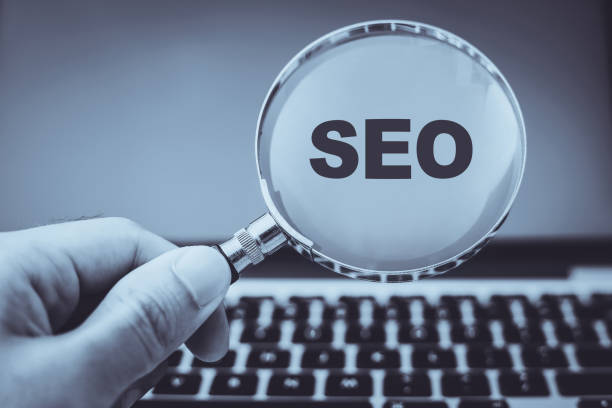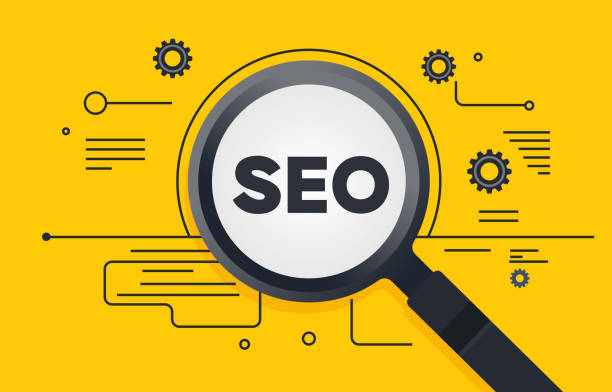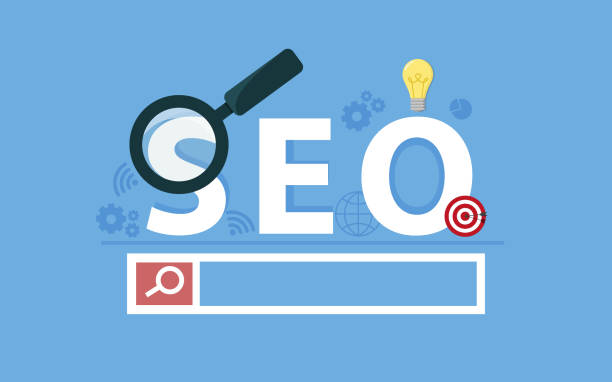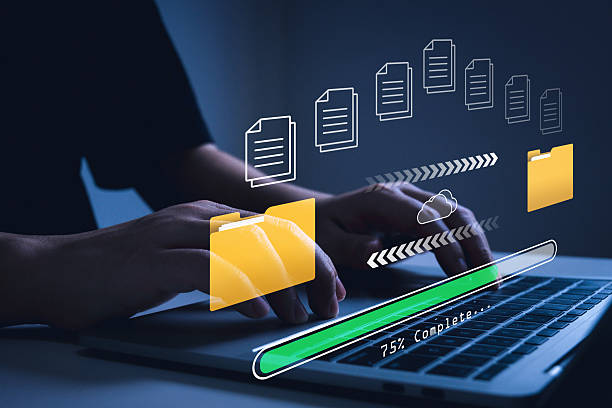Introduction to Off-Page SEO and Its Importance

Off-Page SEO, or simply Off-Page SEO, refers to a set of activities performed outside your website with the goal of improving its ranking in search engine results.
These activities primarily focus on #link_building and gaining #domain_authority.
In today’s competitive world, merely having excellent content and flawless on-page SEO is not enough; to achieve top Google rankings, a powerful off-page SEO strategy is required.
The importance of this section of SEO is such that it can be considered the backbone of ranking success.
Search engines like Google consider websites that have received links from other reputable sources more authoritative.
These links act like votes of confidence.
The higher the quality and number of these votes, the more your site’s credibility increases in Google’s eyes.
Imagine your website is a library; on-page SEO is like organizing and categorizing books on shelves, but off-page SEO is like recommendations given by prominent professors and other reputable libraries about your books.
Without these recommendations, even if you have the best books, no one might know about them.
Therefore, for any online business seeking visibility and organic traffic, mastering the principles and techniques of off-page SEO is an essential and vital matter.
This field is constantly changing, and to succeed, one must always be familiar with the latest updates.
Losing potential customers due to an unprofessional website? Rasaweb is your answer! With our specialized corporate website design services:
✅ Enhance your business’s credibility and position
✅ Experience attracting more targeted customers
⚡ Act now to receive a free consultation!
What is the Difference Between On-Page and Off-Page SEO?

To better understand the concept of Off-Page SEO, it’s necessary to first clarify its difference from On-Page SEO.
On-page SEO refers to all actions taken within your website to optimize it for search engines.
These actions include #keyword optimization in content, URL structure, Title Tags, Meta Descriptions, image optimization, site loading speed, responsive design, and creating an internal linking structure.
The main goal of on-page SEO is to help search engines better understand your page content and categorize them correctly.
On the other hand, off-page SEO focuses on activities that occur outside your website, aiming to increase the website’s credibility and Domain Authority.
The main part of off-page SEO is Link Building.
This includes getting backlinks from other websites, social media activity, participation in forums and communities, and even your brand being mentioned in other sources.
While on-page SEO tells Google “What is my website about?”, off-page SEO tells Google “How credible and trustworthy is my website?”.
Both sections complement each other, and without the other, achieving top rankings is almost impossible.
Great content without strong backlinks might never be seen, and conversely, numerous backlinks to low-quality or irrelevant content not only don’t help but can harm your site.
Therefore, a comprehensive approach to Search Engine Optimization (SEO) involves a smart combination of both strategies.
External Link Building: The Backbone of Off-Page SEO

Undoubtedly, External Link Building is the most crucial and vital part of off-page SEO.
This activity means receiving links from other websites to your site.
Google and other search engines consider backlinks as votes of confidence from one site to another.
The greater the number and quality of these votes, the more your site’s credibility increases in the eyes of search engines.
But the important point is that not every link, but only high-quality and relevant links, hold true value.
A quality backlink is a link that points to your site from a website with #high_authority (Domain Authority), #relevant_content, and #real_traffic.
For example, receiving a link from a reputable news site or a specialized blog in your field of work is worth much more than dozens of links from low-quality and spam sites.
There are various link-building strategies, each with its own advantages and disadvantages.
These strategies include guest blogging (writing content for other sites and receiving links), broken link building (finding broken links on other sites and suggesting your content as a replacement), creating shareable infographics, producing viral and debatable content, and also participating in specialized forums.
Choosing the best strategy depends on your field of activity, target audience, and budget.
You should never pursue buying bulk low-quality backlinks, as this not only won’t help improve your ranking but can also lead to your site being penalized by Google.
Ultimately, quality always takes precedence over quantity.
Main Types of Backlinks and Their Characteristics
| Type of Backlink | Description | Advantages | Disadvantages/Risks |
|---|---|---|---|
| Dofollow Links | Links that pass authority (Link Juice) from the source site to the destination site. | Have the most significant impact on SEO and ranking improvement. | Harder to acquire; spam links can be harmful. |
| Nofollow Links | Links that tell search engines not to pass authority. | Can still attract traffic and create a natural link profile. | Do not directly affect rankings but help diversify the link profile. |
| Sponsored Links | Links created in exchange for payment or advertising (with rel="sponsored" tag). | Transparency with Google; a way for indirect advertising. | Do not directly pass SEO authority. |
| UGC Links | User Generated Content links in forums, comments, etc. (with rel="ugc" tag). |
Increased engagement and visibility. | May have low quality; require monitoring. |
Methods for Building Quality Backlinks for Off-Page SEO

After understanding the importance of link building in Off-Page SEO, it’s time to examine practical methods for building quality backlinks.
One of the most effective methods is #Guest_Blogging.
In this method, you write valuable and specialized content for other blogs or websites in your field of work and, in return, receive one or more links to your site.
This method not only provides you with backlinks but also increases brand awareness and drives referral traffic.
The key point in guest blogging is choosing relevant and reputable websites.
The second method is using the #Broken_Link_Building strategy.
You can find broken links on other websites using specific tools.
Then, by contacting the site administrator, offer your content as a suitable replacement for the broken link.
This method is attractive to site administrators because it helps them improve their site’s user experience.
Third, creating #Linkable_Assets content.
This can include attractive infographics, original research, comprehensive guides, free tools, or even humorous and entertaining content that naturally encourages users and websites to link to it.
Creating infographics with compelling statistics can help you get shared on other blogs and sites and acquire links.
Fourth, engaging in #online_forums and #specialized_forums.
By providing helpful and valuable answers on these platforms, you can naturally add links to your website.
However, you must be careful that this linking does not appear spammy.
Fifth, #Digital_PR, which involves creating events or news that lead media outlets and news blogs to link to you.
This analytical and guiding approach helps you get the best results from your off-page SEO campaign.
How much does losing business leads due to an unprofessional site cost you? Solve this problem forever with professional corporate website design by Rasaweb!
✅ Increase credibility and trust among potential customers
✅ Easier attraction of new business leads
⚡ Get a free consultation now!
Competitor Analysis in Off-Page SEO Strategy

One of the most important steps in formulating an effective strategy for Off-Page SEO is accurate competitor analysis.
In this aspect of SEO, you shouldn’t reinvent the wheel; instead, you can gain valuable insights by examining the successful performance of your competitors.
The first step is #identifying_key_competitors in search results for your important keywords.
Websites ranking higher than yours usually have high-quality and diverse backlinks.
After identification, you should analyze their backlink profile.
Tools like Ahrefs, SEMrush, Moz, and Majestic SEO are very powerful in this regard.
These tools allow you to see which websites your competitors have received links from, the quality of these links (e.g., the Domain Authority of the source sites), what their anchor text type is, and how quickly they acquired links.
By carefully reviewing this information, you can discover opportunities that your competitors have utilized and that you were unaware of.
For example, you might realize that your competitor has gained many links through guest blogging on a reputable specialized site.
This could be an opportunity for you to contact that site and propose a similar collaboration.
Also, by analyzing the Spam Score of competitors’ backlinks, you can identify toxic links and avoid creating links from such sources.
This part of off-page SEO takes an analytical and specialized approach, helping you build your strategy based on real data and proven successes, not just guesswork.
Competitor analysis is not only a guide for building backlinks but also a roadmap for better understanding the SEO ecosystem in your industry.
The Role of Social Signals in Off-Page SEO

In the discussion of Off-Page SEO, the question often arises whether #Social_Signals have a direct impact on website rankings in Google. Social signals include likes, shares, comments, and page follows on social networks such as Instagram, Facebook, Twitter, LinkedIn, and Telegram.
The direct answer to this question is that Google has repeatedly stated that social signals are not directly considered a ranking factor in its algorithms.
That is, a post with a high number of likes does not, by itself, lead to a ranking increase.
However, this does not mean they are insignificant.
Social signals have important indirect effects on off-page SEO that cannot be ignored.
Firstly, increased sharing of your content on social networks leads to #increased_visibility of that content.
The more your content is seen, the greater the likelihood that it will be noticed by other websites, bloggers, and influencers, and linked to.
It is these links (backlinks) that have a direct impact on SEO.
Secondly, referral traffic from social networks can be directed to your website.
Increased traffic indicates to Google that your website has valuable content that users are interested in.
Thirdly, social signals can contribute to #increased_brand_awareness.
A more recognized and popular brand is more likely to be seen in direct user searches, which itself can be a positive signal for Google.
Although social signals do not directly play a role in ranking, they act as a powerful catalyst that significantly aids your off-page SEO goals indirectly.
Therefore, creating entertaining, shareable, and engaging content for social media is an integral part of a comprehensive SEO strategy.
Analyzing Domain Authority and Spam Score in Off-Page SEO

In analyzing and selecting sources for Off-Page SEO, two very important metrics exist: #Domain_Authority (DA) and #Spam_Score.
Domain Authority (DA) is a metric developed by Moz that predicts how well a website will rank in search engine results.
This score ranges from 1 to 100, and the higher it is, the more credibility and power that domain indicates.
DA is calculated based on multiple factors such as the number and quality of backlinks, domain age, and overall SEO strength of the site.
Receiving backlinks from sites with high DA has a very positive impact on your off-page SEO.
This is a very specialized and analytical SEO tutorial.
In contrast, Spam Score, also introduced by Moz, indicates the likelihood of a domain being spammy.
This metric also ranges from 1 to 17, and the higher it is, the higher the risk of receiving a link from that site.
Websites with high spam scores usually have many low-quality links, their content is spammy, or they use black-hat SEO techniques.
Receiving links from such sites can, instead of helping off-page SEO, lead to your site being penalized by Google.
Therefore, when choosing sites for link building, special attention should always be paid to these two metrics.
Tools like MozBar (Chrome extension), Ahrefs, and SEMrush provide accurate information regarding DA and Spam Score.
The goal is to receive links from sites with high DA and low Spam Score.
Understanding and correctly using these two metrics is a vital guide for any SEO professional to ensure a healthy and effective link structure for their site and to avoid potential risks.
Comparison of Domain Authority Metrics
| Metric | Developer Tool | Primary Use | Score Range | |||
|---|---|---|---|---|---|---|
| Domain Authority (DA) | Moz | Predicting the overall ranking of a domain in SERP | 1-100 | |||
| Page Authority (PA) | Moz | Predicting the ranking of a specific page in SERP | 1-100 | |||
| Ahrefs Rank (AR) | Ahrefs | Ranking websites based on backlink profile strength | URL Rating (UR) | Ahrefs | Backlink profile strength of a specific URL | 0-100 |
| Domain Rating (DR) | Ahrefs | Backlink profile strength of an entire domain | 0-100 |
Google Penalties and Illicit Off-Page SEO

In the process of optimizing Off-Page SEO, you must be careful to avoid illegal and unethical methods known as #Black_Hat_SEO.
Google has complex algorithms to maintain search result quality, capable of identifying and penalizing sites that use these methods.
Google penalties can have devastating effects on your website’s ranking and traffic, and may even lead to your site being completely removed from search results.
The most common type of black-hat SEO in the off-page SEO domain is #link_buying and #artificial_link_building in large volumes and with low quality.
This includes using low-quality Private Blog Networks (PBNs), spam link directories, spam comment forums, and any attempt to manipulate algorithms through unnatural link building.
Google constantly updates its algorithms to identify these methods.
For example, Penguin Updates were specifically designed to combat link spam.
If your site becomes the target of a #negative_link_attack (meaning competitors intentionally build toxic links to your site), you can use the Disavow Links tool in Google Search Console to disavow those links and inform Google that you are not responsible for them.
The important guidance is to always focus on #natural and #organic_link_building.
Backlinks naturally given by other websites due to your valuable content are always the most stable and beneficial type of links for off-page SEO.
Penalties can include keyword ranking drops, removal of specific pages, or even complete domain removal from Google’s index.
Therefore, vigilance and adherence to ethical principles in SEO are vitally important to prevent any unpleasant news.
Losing potential customers due to an unprofessional website? Rasaweb is your answer! With our specialized corporate website design services:
✅ Enhance your business’s credibility and position
✅ Experience attracting more targeted customers
⚡ Act now to receive a free consultation!
Monitoring and Analyzing Off-Page SEO Performance

After implementing Off-Page SEO strategies, the #monitoring_and_analysis stage of performance is of high importance.
Without measuring results, you cannot understand which strategies have been effective and which need improvement.
This section includes an analytical and educational aspect of off-page SEO.
Various tools exist for monitoring backlinks and their impact on SEO ranking, among the most important of which are #Google_Search_Console, Ahrefs, SEMrush, and Moz.
Google Search Console is a free and essential tool from Google itself that provides valuable information about incoming backlinks to your site (Links section), Crawl Errors, keyword performance in searches, and page indexing status.
Using this tool, you can see which sites have linked to you, what their anchor text is, and which of your pages have received the most links.
Paid tools like Ahrefs and SEMrush provide much more comprehensive information.
They allow you to accurately analyze your backlink profile and that of your competitors, identify lost links, find spam links, and track your progress over time.
Important metrics to monitor include #number_of_new_backlinks, #referring_domains (number of unique domains linking to you), #link_quality (DA/DR of source sites), #referral_traffic from links, and #target_keyword_ranking_increase.
This regular monitoring helps you optimize your strategy, discover new link-building opportunities, and quickly identify and resolve any potential issues such as toxic links or sudden drops in links.
This is a continuous cycle of execution, monitoring, and improvement that is essential for long-term success in off-page SEO and includes practical guidance for professionals and newcomers alike.
The Future of Off-Page SEO and New Trends

The world of SEO, including Off-Page SEO, is constantly evolving and changing.
With advances in technology and artificial intelligence, Google’s algorithms have become smarter and more complex.
Therefore, SEO professionals need to be familiar with new trends to keep their strategies updated.
One of the most important future trends is a greater focus on #Brand_Mentions.
Google is increasingly valuing brand credibility and popularity outside of traditional link-building.
Although your brand being mentioned on other websites without a direct link (Unlinked Mentions) does not directly pass "Link Juice," it is a powerful signal to Google that your brand is recognized and discussed.
This can indirectly help increase credibility and, consequently, improve off-page SEO ranking.
Another trend is a greater emphasis on #User_Experience and #Content_Quality.
Although these are considered part of on-page SEO, they indirectly affect off-page SEO as well.
High-quality content and excellent user experience make users stay longer on your site, visit more pages, and increase the likelihood of sharing and linking to your content.
This is an expert look at the future and its trends in SEO.
Furthermore, the importance of E-A-T factors (Expertise, Authoritativeness, Trustworthiness) is increasing.
Google seeks to identify sources written by experts, which are authoritative in their field, and trustworthy.
These factors become particularly important in off-page SEO because receiving links from websites and authors with high E-A-T will have a very positive impact on your site’s credibility.
Finally, video content production and podcasts, due to their increasing popularity, can lead to new opportunities for off-page SEO and attracting links from various platforms.
These news and entertainment areas also, subconsciously, help improve your SEO.
Frequently Asked Questions
| Row | Question | Answer |
|---|---|---|
| 1 | What is Off-Page SEO? | Off-page SEO refers to a set of actions performed outside your website to improve its ranking in search engines. These actions include backlink building, social media presence, branding, and more. |
| 2 | Why is Off-Page SEO highly important? | Off-page SEO shows search engines that your website is credible, popular, and trustworthy. High-quality backlinks from reputable sites are strong signals for better rankings and help increase your domain’s authority. |
| 3 | What are the most important components of Off-Page SEO? | The most important components of off-page SEO include: Link Building, Content Marketing, Social Media Marketing, Influencer Marketing, and Online Reputation Management. |
| 4 | What is a backlink and why is it important for Off-Page SEO? | A backlink is a link that points from another website to your website. These links act as "votes of confidence" from Google’s perspective and indicate the credibility of your content. The more backlinks you have and the higher their quality, the better your site’s ranking will be. |
| 5 | What are the types of backlinks in terms of SEO impact? | The two main types of backlinks are DoFollow and NoFollow. DoFollow backlinks pass authority (Link Juice) and directly impact ranking. NoFollows do not pass authority but can still generate traffic and help make the link profile appear natural. (Also UGC and Sponsored) |
| 6 | How can quality backlinks be created for your site? | To build quality backlinks, methods such as: producing excellent and shareable content, Guest Posting on relevant and reputable sites, Broken Link Building, Digital PR, and competitor backlink analysis can be used. |
| 7 | What are Toxic Backlinks and how do they affect a site? | Toxic or spam backlinks are links that point to your site from low-quality, spammy, or irrelevant websites. These backlinks can harm your site’s ranking and even lead to penalties by Google’s algorithms. |
| 8 | What is the role of social networks in Off-Page SEO? | Although social signals (likes, shares, etc.) are not direct ranking factors, they help off-page SEO. They increase content visibility, drive direct traffic to the site, and ultimately enhance the chance of acquiring natural backlinks and improving brand recognition. |
| 9 | What is the importance of diversity in the backlink profile? | Diversity in the backlink profile means that your links come from various sources (blogs, forums, news sites, directories), with diverse anchor texts, and include a mix of DoFollow and NoFollow links. This diversity indicates to Google that your link building is natural and organic. |
| 10 | What are common mistakes in Off-Page SEO that should be avoided? | Common mistakes include: buying backlinks in large volumes from low-quality sources, excessive link building with target keywords (Over-optimization), neglecting quality in favor of quantity in backlink building, lack of diversity in the link profile, and ignoring toxic backlinks and not disavowing them. |
And other services by Rasaweb Advertising Agency in the field of advertising
Smart Direct Marketing: A fast and efficient solution for user engagement focusing on SEO-driven content strategy.
Smart Brand Identity: A professional solution for campaign management focusing on SEO-driven content strategy.
Smart Marketplace: A combination of creativity and technology for user interaction through key page optimization.
Smart Direct Marketing: A novel service for increasing digital branding through key page optimization.
Smart Custom Software: A novel service for increasing user engagement through SEO-driven content strategy.
And over a hundred other services in the field of internet advertising, advertising consultation, and organizational solutions
Internet Advertising | Advertising Strategy | Advertorial
Sources
External Link Building and Its Impact on SEO
The Importance of Off-Page SEO in Increasing Traffic
Effective Off-Page SEO Strategies
What is Off-Page SEO? Complete Guide
? With Rasaweb Afarin, your business shines in the digital world! With our expertise in key areas of digital marketing, including multilingual website design, Search Engine Optimization (SEO), and professional social media management, we are ready to elevate your brand to the top.
📍 Tehran, Mirdamad Street, next to Bank Markazi, Kazeroun Jonoubi Alley, Ramin Alley No. 6




